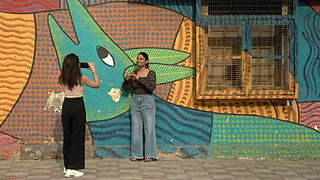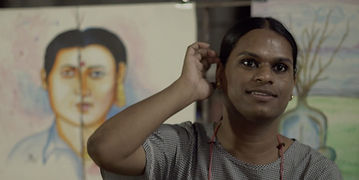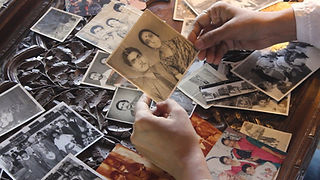The film festival interspersed with panel discussions believes that documentaries are a powerful medium that contribute immensely to prompting introspection and creative initiatives to bring about change at the local, national and regional level. Notions of belonging and nationhood, gender and identity, personal longing and societal taboos are the threads that weave the fabric of our region. The selected films will be both national and international documentaries that seek to entertain and educate, make us laugh and weep, question and hope.
Schedule
13th February, 2024
11:00 AM
Film screening followed by discussion
Before You Were My Mother
Nepal | 2022 | 73 mins | Nepali/Manipuri/Newari
Director: Prasuna Dongol
1:15 PM
Film screening followed by discussion
Face Cover
Sri Lanka | 2022 | 70 mins | Tamil
Director: A.M. Ashfaque
2:40 PM
Film screening followed by discussion
Flames of a continuous Field of Time
Nepal | 2022 | 54 mins | Nepali/Maithili/Bhojpuri/English
Director: Barkha Mukhia

3:50 PM
Film screening followed by discussion
Gurkha Girl
Nepal | 2021 | 35 mins | Nepali
Director: Bishal Roka Magar
14th February, 2024
10:30 AM
Film screening followed by discussion
This Stained Dawn
Pakistan | 2021 | 89 mins | Urdu/English
Director: Anam Abbas
1:15 PM
Film screening followed by discussion
Iqraar- Naama (The Agreement)
India | 2021 | 55 mins | Hindi
Director: Priyanka Chhabra

1:15 PM
Film screening
If I Could Tell You
India | 2022 | 69 mins | Indian Sign Language/English/Hindi
Director: Niharika Popli
15th February, 2024

11:00 AM
Film screening followed by discussion
Ghar ka Pata (Home Address)
India | 2021 | 67 mins | Hindi
Director: Madhulika Jalali
1:15 PM
Film screening followed by discussion
Taangh (Longing)
India | 2021 | 75 mins | Hindi
Director: Bani Singh
Southasia, used as a single word, is a cohesive, syncretic region with shared histories, cultures, languages, popular culture, waters, trade and economy. Though often drowned out by the clamour and compulsions of politics, the commonalities of a shared colonial past, and potential for mutual interdependence and harmonious co-existence in the future draw us together.
This festival believes that the documentary is a powerful medium that contributes immensely to prompting introspection and creative initiatives to bring about change at the local, national and regional level. Notions of belonging and nationhood, gender and identity, personal longing and societal taboos – these are the threads that make up the shared weft and weave of the fabric of our region.
Through films and accompanying conversations, the festival will create space for reflection, critical thinking and debate around a multitude of diverse strands that bind Southasians. In a first time venture, the Kathmandu-based Southasia Trust (with its two arms Film Southasia and Hri Institute of Research and Exchange) supported six films from Nepal, Bangladesh, India and Sri Lanka that attempt to transform the visual depiction of women and violence across media in the region. We present these, along with the other selections from Travelling Film Southasia documentaries that seek to entertain and educate, make us laugh and weep, question and hope.
Societal conflict, violence and complex family structures are poignantly expressed through Before You Were My Mother. Exploring the relationship between mothers and daughters, unearthing layers of childhood, youth and past traumas, this intensely personal observational documentary moving from Manipur to Nepal, touches each one of us.
Flames of a Continuous Field of Time uses wide spectrum visual imagery to engulf us in accounts of violence on Dalit women’s bodies across the plains and hills of Nepal. Harrowing experiences are shared with sensitivity and care, both for the audience and the women who tell these stories.
In Sri Lanka, the Face Cover extends beyond gender, affecting all marginalized individuals. In a country laden with political and social significance for Muslim identity, the face cover serves as a symbolic crossing of boundaries, an outward manifestation of internal conflicts, and a reflection of continuing societal violence, prompting profound questions for the women it impacts.
Decoding Gender from Bangladesh tells stories of women’s rights, trans identities and the quest for gender representation through the personal journey of the filmmaker. In a remote village of Nepal, we follow the yearning of a Gurkha Girl wanting to join the British Gurkha regiment, her aspirations resonating with every young woman trying to break out of the stranglehold of tradition.
Over in Karachi, the city’s feminists organise a women's march, coming up against Pakistan’s state, media and radical religious right. We follow the Aurat March’s organisers as they negotiate a deeply surveilled, paranoia-inducing, and often physically violent space in the hopes of spurring a revolution for women's rights. This Stained Dawn is not just about the "Aurat March", but about the act of political organising itself.
From vehemently public protests, the arc to deeply personal acts of resistance holds lessons for us all. If I Could Tell You is an evocative inquiry into the significance of language in our shared human experience. How can various manifestations of visual language and expression help us understand violence, agency, autonomy and care? How can we make meaning of silences?
Iqrar-nama (The Agreement) is the story of a partition refugee from Lyallpur who collected, archived and preserved every official piece of paper that told his story of love and loss; of ‘home’.
Two poignant tales of exile tell us of a deep longing for what the heart defines as “home”. Ghar ka Pata (Home Address), tracks the journey of a young Kashmiri pandit woman returning to her birthplace after 24 years of exile to tell a story of hope and humanity in the midst of conflict. Taangh (Longing) is a daughter’s tribute to her father, a member of the first Indian hockey team to win the Olympic gold. Her poignant journey to her father’s watan (homeland) brings to life memories of love, friendship and sacrifice even in the throes of a violent partition.
Through film and dialogue, we hope to collaboratively catalyse fresh ways of representing violence and justice.
Our collaborators












